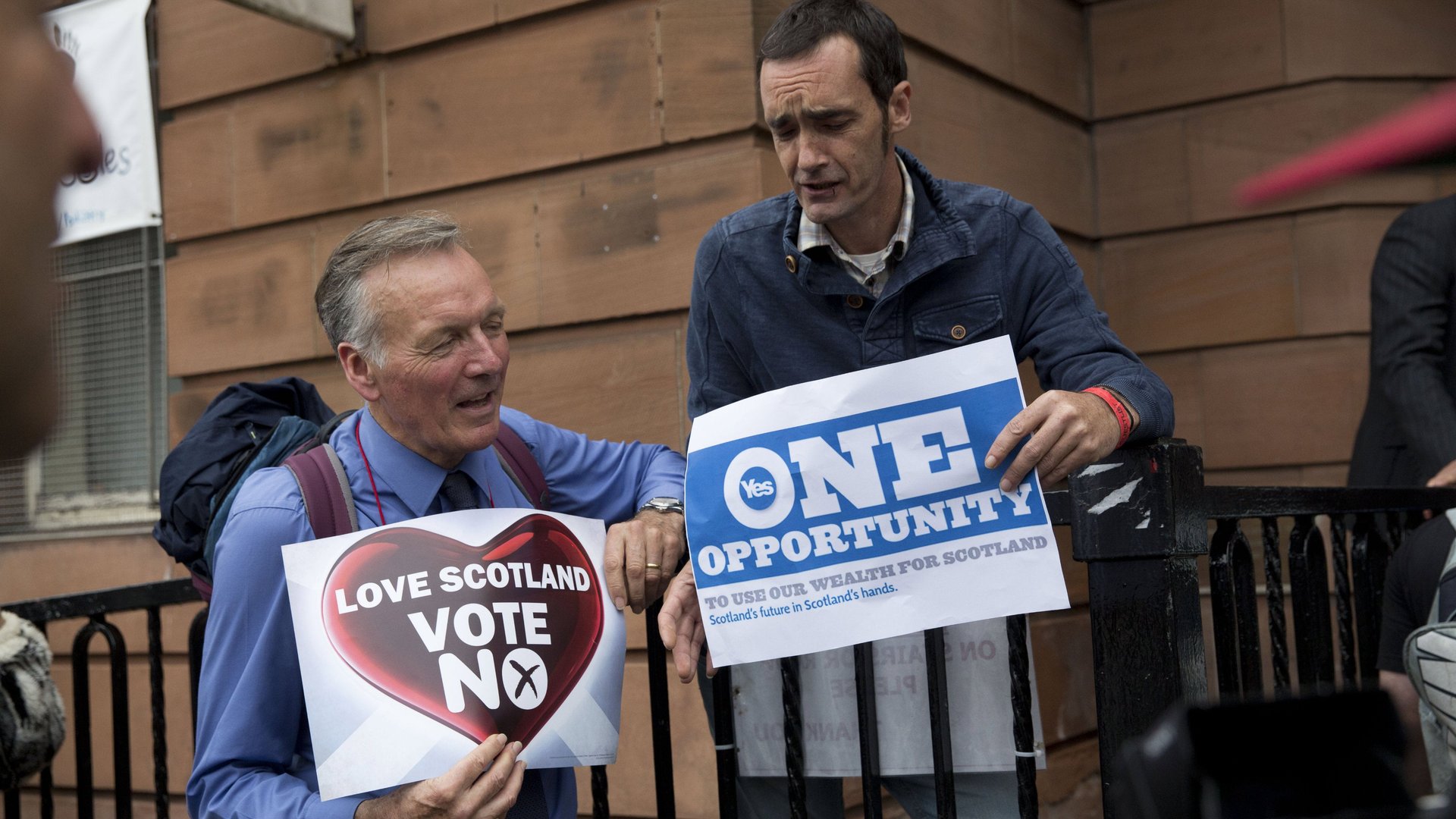Scots don’t dislike Britain quite enough for a divorce, but the relationship is still testy
Scots voted by a decent margin yesterday to maintain their country’s 307-year-old union with Britain. But like a long-married couple that has been to the brink of divorce, just about everyone involved—the pro-independence “Yes” voters who fell short, the “No” voters who had a closer-than-expected brush with defeat, and the UK politicians who wooed their northern neighbors with last-minute promises—may be feeling a little bruised.


Scots voted by a decent margin yesterday to maintain their country’s 307-year-old union with Britain. But like a long-married couple that has been to the brink of divorce, just about everyone involved—the pro-independence “Yes” voters who fell short, the “No” voters who had a closer-than-expected brush with defeat, and the UK politicians who wooed their northern neighbors with last-minute promises—may be feeling a little bruised.
“Scotland has decided by majority not, at this stage, to become an independent country. I accept that verdict of the people,” said Alex Salmond, Scotland’s pro-independence leader, in his concession speech. “Let us not dwell on the distance we have fallen short. Let us focus on the distance we have traveled…. We will go forward as one nation.”
Despite the defeat of the independence referendum, the “No” vote will still create big changes in the UK, partly as a result of the brinksmanship that led to the surprisingly close referendum—especially British prime minister David Cameron’s insistence on holding an up-or-down independence vote instead of offering an option for greater devolution of powers to Scotland.
The New York Times has an account of a meeting between Cameron and his advisors in 2012:
Mr. Cameron told a group of advisers that Mr. Salmond would have his referendum. But he would refuse the demand for a second, softer option on the ballot for more autonomy for Scotland. He would call Mr. Salmond’s bluff. There would be a single question: Should Scotland stay inside the United Kingdom or leave it forever?
The depiction conjures an ultimatum given to an unhappy spouse, with no negotiations about who will be responsible for paying the mortgage or doing the chores: take this marriage or leave it. It was only after Scotland’s “Yes” vote made surprising gains this month that Cameron and other mainline UK political leaders watered down the ultimatum and agreed to most of the demands made by Scotland in the first place.
In the end, Scotland was promised more autonomy over taxation, spending, and social welfare programs, which will have far-reaching implications for the relationship going forward.
Writing before the vote, US-based marriage therapist Keith Miller noted that many of the differences between Scotland and the rest of the UK were relatively mundane ones, which “don’t seem like the kind of rifts that could force a country that’s been ‘married’ for 300 years to just split in half.” But that’s not an uncommon problem for long-married partners.
“Some people simply reach a point where they are convinced that the grass truly is greener elsewhere during a long-standing partnership,” Miller wrote on his blog. “Couples that overestimate the benefits of independence and underestimate the hidden costs can wind up feeling much worse than being in the throes of struggle with their spouse.”
Those may be comforting words for anyone waking up with a hangover—real or metaphorical—the morning after Scotland’s momentous vote.